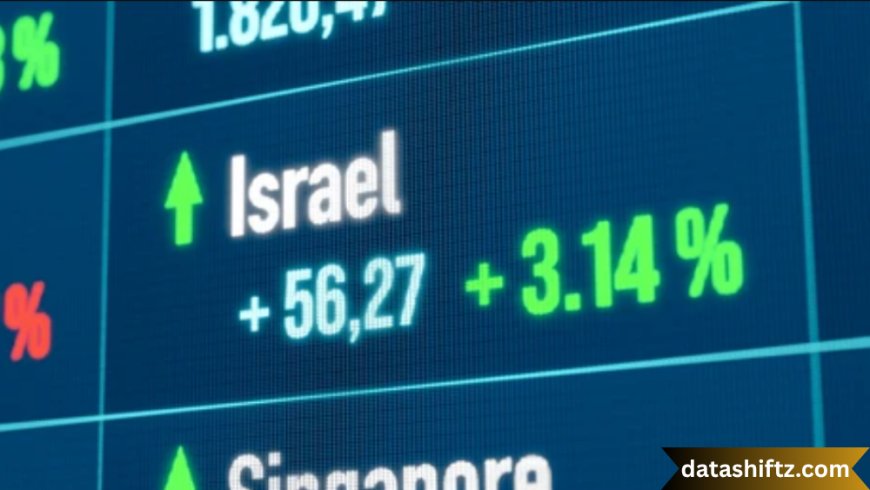Israel Stock Market: Resilience Amid Turbulence in 2025

Introduction
The Israel stock market, centered around the Tel Aviv Stock Exchange (TASE), has demonstrated remarkable resilience in 2025. Despite challenging geopolitical events—including escalations with Iran and fallout from the Gaza conflict—TASE indices are showing robust gains. This blog dives into performance trends, key drivers and risks, the regulatory landscape, and what investors should monitor in the near future.
Market Overview & Recent Performance
TA‑125 Index in 2025
The TA‑125 index, which tracks the 125 most liquid Israeli stocks, has risen approximately 5.2% year-to-date, rebounding strongly after January peaks . After hitting an all-time high over 2,600 points in February, the index remains robust—now trading around 2,553 .
Benchmark Comparisons
| Index | YTD Performance | Notes |
|---|---|---|
| TA-125 | +5.2% | Near all-time highs |
| TA-35 | ~+4% | Led by financials and banks |
| Global Indices (S&P/Nasdaq) | –14% / –19% | Underperforming compared to TASE |
Drivers of Growth & Investor Confidence
Banking & Finance Power Surge
Israeli bank stocks have spearheaded TASE’s rally:
-
TA Banks Index: up 18% YTD
-
Insurance Index: up ~22%, with >80% gains annualized
Banks such as Hapoalim and Leumi each represent over 8% of TA-35, fueling stability through dividend yields and corporate resilience .
Tech & High-Growth Sectors
Israel's high-tech sector remains a global leader:
-
TA BlueTech & Tech-Elite indices house leading cybersecurity, AI, and biotech firms
-
Q4 2024: Israeli tech stock index up ~7.5%, with the broader BIGI index up ~12.6%
Strong Macroeconomic Backdrop
A resilient domestic economy underpins investor confidence:
-
GDP growth expected at ~4% by BoI; Q1 rebased to ~3.7%
-
Unemployment near record lows of 2.6–2.9%
-
Inflation moderating at ~3–3.4%, within central bank target range
Risks & Volatility Catalysts
Geopolitical Instability
The Israel–Iran conflict has weighed on volatility:
-
Surge in Iranian missile strikes on Tel Aviv & Haifa, with civilian risks
-
But markets have rebounded post-retaliatory strikes, with TA-125 up ~2.6% on June 16
Regulatory & Market Structure Factors
-
Concentration risks: ~33% of TA-35 is comprised by banks; broader pyramid-holding structures persist
-
ISA compliance costs: stronger AML and disclosure demands raise market entry costs
-
Cybersecurity pressures due to digital infrastructure reliance
Global Macro Sensitivities
-
Interest rates: BoI’s benchmark rate at ~4.5%, likely to stay elevated through 2025
-
Global equity concerns ripple into Israeli markets—though TASE has so far outperformed
Structural & Regulatory Developments
Trading Week Adjustment
Starting 2026, TASE will shift to Monday–Friday trading, aligning with global markets, supporting MCSI index inclusion, and attracting foreign capital
Market Modernization & Transparency
-
Dividend reporting will shift to a per-share format by February 2025
-
Continuous market digitization and infrastructure improvements are underway
Investor Strategy & Outlook
Opportunities to Consider
-
Bank & big financial names: Look for high-dividend, stable yield plays.
-
Technology stocks: AI/cybersecurity-led multi-year secular growth.
-
ESG-themed investments: Rising traction in sustainable Israeli firms
-
Infrastructure & renewables: Growth sectors as Israel capitalizes on green energy.
Risks to Monitor
-
Escalating regional conflict could impact market sentiment.
-
Global economic headwinds may compress valuations.
-
Regulatory costs might hamper smaller firms.
Israel Stock Market – Key Drivers & Risks
| Factor | Positive Impact | Risk to Market |
|---|---|---|
| Economic Growth | Supports earnings & investor flow | Budget deficit (~6–7% GDP) |
| Bank & Finance Stocks | Dividend income, stability | Concentration risk |
| High-Tech Sector | Innovation-led growth | Global tech slowdown |
| Geopolitical Tensions | None | Heightened volatility |
| Regulatory Reform | Transparency & trust | Higher compliance costs |
| Trading Hours Shift | Global alignment, capital inflow | Short-term structural adjustments |
The Road Ahead
2025–2030 Market Outlook
-
Diverse IPO and M&A pipeline, especially in tech, fintech and clean energy
-
Continued regulatory modernization will support capital market depth and investor protection
-
Dividend yield (~2.9%) remains attractive vs global peers
What to Track
-
Israel–Iran conflict escalation or de-escalation
-
BoI rate decisions and inflation trends
-
TASE index rebalances and international inclusion (e.g., MSCI)
-
Cybersecurity and AML policy changes
Conclusion
The Israeli stock market stands as a testament to economic resilience—outperforming global benchmarks amid geopolitical disturbance. Strong performance from banks and tech firms, robust macro fundamentals, ongoing market reform, and structural shifts like the 2026 trading schedule all position TASE for continued growth.
Nevertheless, investors must weigh geopolitical volatility and regulatory risks carefully. For those seeking exposure to high-growth, dividend-driven, or technology-driven portfolios, Israel offers compelling opportunities—provided a disciplined strategy and vigilant monitoring.
Would you like a sectoral infographic, downloadable investment summary PDF, or a deeper portfolio strategy guide tailored to Israeli equities? I’d be happy to create that for you!





























